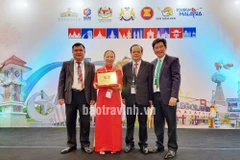Hanoi (VNA) – The tourism sector of Vietnam has seen strong recovery since the beginning of this year, with many localities recording impressive revenues of trillions of VND in January, and the number of domestic tourists rising roughly 19% compared to the same period in 2024 to 12.5 million.
Impressive tourism revenue
According to the Vietnam National Authority of Tourism (VNAT), the nine-day Lunar New Year (Tet) holiday saw significant growth in tourist numbers, generating impressive revenues during the first month of the year. Notably, many localities reported trillions of VND in tourism revenue during the period.
Ho Chi Minh City led the way, welcoming an estimated 2.1 million visitors, up 16.7% from the same period in 2024. The city generated about 7.69 trillion VND (304.31 million USD) in tourism revenue, reflecting a 17.4% year-on-year increase. Hanoi followed closely, attracting around 1 million tourists, earning an estimated 3.53 trillion VND in revenue, up 6% and 7.85%, respectively.
VNAT Director Nguyen Trung Khanh credited these results to local authorities' careful preparation for the Tet holiday and businesses' efforts to adhere to safety protocols, ensuring that visitors had safe and enjoyable experiences.
The early announcement of the holiday, coupled with favorable weather conditions across the country, contributed to a rise in travel demand compared to 2024, he said, adding the hospitality sector launched appealing promotions and discounts, further stimulating tourism.
New momentum in 2025
The data from January 2025 highlights the robust recovery of Vietnam’s tourism industry, which began reopening in March 2022 after the COVID-19 pandemic. In 2024, the country welcomed approximately 17.5 million international visitors, returning to the pre-pandemic level of 2019—a period of significant growth.
According to Khanh, the positive growth trend, alongside international recognition and internal reforms, signals that Vietnam’s tourism sector is poised for even stronger growth and ready to enter a new phase of development with fresh momentum and new opportunities.
This year, the sector has set ambitious targets of attracting 22-23 million international tourists, serving 120-130 million domestic visitors, and generating record revenue of 1 quadrillion VND.
To achieve these goals, the focus will be on enhancing quality, professionalism, sustainability, and brand promotion. Efforts will be made to improve service standards, offer premium tourism products, and provide exceptional, memorable experiences for visitors.
The VNAT Director emphasised two key factors: human resources and technology. He noted that the Vietnamese workforce must undergo more comprehensive training, particularly in foreign languages, communication skills, and specialized knowledge, to meet international standards. Technology will also play a crucial role in improving the visitor experience, from mobile app-based ticket booking and virtual tours of destinations to cashless payments and feedback systems, he added.
Vietnam is uniquely positioned with its rich natural resources, stunning landscapes, historical sites, and UNESCO-recognised cultural heritage. The country’s tourism sector will continue to develop distinctive products that showcase the uniqueness of its destinations, helping promote Vietnam’s image and boost competitiveness on the global stage./.




























